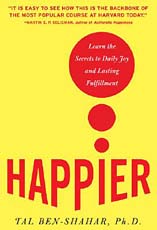"Happiness perception is about recognizing that happiness is the ultimate currency, the end toward which all other goals lead. Happiness perception is not about rejecting the material but rather dethroning it from its status as the highest on the hierarchy. Aristotle understood this when he wrote that 'happiness is the meaning and the purpose of life, the whole aim and end of human existence,' as did the Dalai Lama, who asserted that 'whether one believes in religion or not, whether one believes in this religion or that religion, the very purpose of our life is happiness, the very motion of our life is towards happiness.' The currency through which we take stock of our life — our perception of what matters — has wide-reaching consequences, for our personal lives and for society as a whole. We enjoy higher levels of well-being when we recognize and internalize the fact that happiness is the ultimate currency.
"When the questions that guide our life are about finding more meaning and pleasure (happiness perception) rather than about how we can acquire more money and more possessions (material perception), we are much more likely to derive benefit from the journey as well as the destination. Today, with the prevalence of material perception, too many people are asking the wrong questions. Students mostly wonder how college can help them make more money; when choosing work, they have questions primarily about prestige and progress. No wonder levels of depression are on the rise.
"Happiness perception is about asking the question of questions, 'What will make me happier?' It is about finding the overlap among the three questions 'What gives me meaning?' 'What gives me pleasure?' 'What are my strengths?' It is about asking, 'What is my calling?' and identifying the things that you really, really want to do at school, at work, and with your life as a whole. With these questions comes a much higher likelihood that you will find the ultimate currency."
